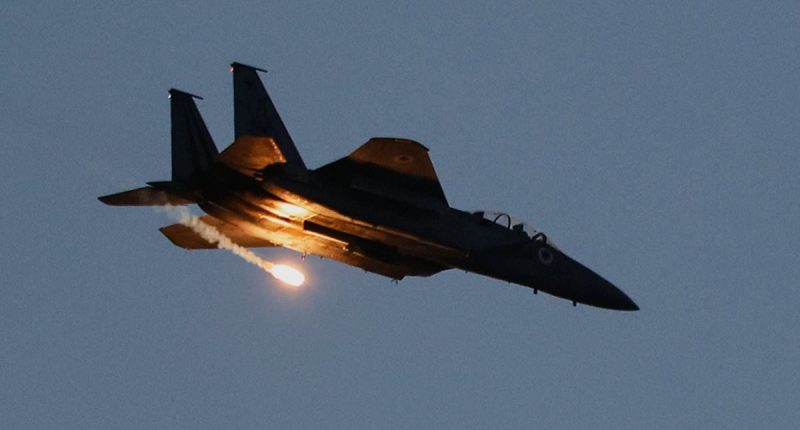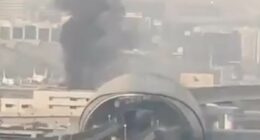Share this @internewscast.com
The United States has told embassy staff in Iraq to evacuate amid fears Israel could be poised to strike Iran within days, regardless of American support.
Non-essential US embassy staff in Baghdad are set to leave due to heightened security risks, US government sources have warned without elaborating.
President Donald Trump told media on Wednesday that ‘they are being moved out because it could be a dangerous place and we’ll see what happens’.
Asked why family members of military personnel were allowed to voluntarily leave the region, he ominously replied: ‘You’ll have to see.’
White House spokesperson Anna Kelly said that the decision was taken ‘as a result of a recent review’ by the State Department, without mentioning a possible attack.
But fears of an Israeli attack on Iran have escalated dramatically in recent days, with delicate nuclear talks between Iran and the United States appearing to stall.
Multiple sources told CBS that US officials have been warned that Israel is fully ready to launch an operation into Iran, having long opposed any deal.
Trump acknowledged the perceived threat in comments on Wednesday, saying ‘we are not going to allow’ Iran to develop nuclear weapons.
Iranian defence minister Aziz Nasirzadeh warned, meanwhile, that if talks do fail and ‘a conflict is imposed on us’, Iran ‘will target all US bases in the host countries’.

Armored vehicles belonging to Iraqi security forces are stationed outside the U.S. Embassy in Baghdad’s Green Zone, Iraq, June 12, 2025

An Israeli fighter jet flies over southern Israel, Monday, May 5, 2025

Donald Trump spoke about the Iranian nuclear talks at the Kennedy Center yesterday
A strike on Iran would disrupt the ongoing talks with the United States, now approaching their sixth round. Oman confirmed this morning that it would host the expected US-Iran talks in Muscat on Sunday.
Israel is said to have become more serious about a strike on Iran as the talks approach a preliminary or framework agreement that includes provisions about uranium enrichment that Israel views as unacceptable, NBC reports, citing five people with knowledge of the situation.
A lingering concern is that Iran could retaliate against US personnel or assets in the region for any action by Israel, the report notes.
Sources told the outlet that they were not aware of any planned US involvement in the possible action.
The US could – in theory – support Israel with aerial refuelling or intelligence sharing, rather than direct action against Iran, but the sources were not aware of plans for that, either.
Israel has long been wary of any nuclear deal with Iran, and prime minister Benjamin Netanyahu’s office says that Israel has conducted multiple operations to restrain Iran’s nuclear programme.
Israel is believed to have nuclear weapons already.
Trump, who has already told Israel it would be ‘inappropriate’ to strike Iran as ‘we’re very close to a solution’, is now waiting on Iran’s response to its latest proposals.

An F-15 jet releases a flare as it flies over Gaza, as seen from Israel, June 2, 2025

Israel conducted strikes against Iran in April last year following an Iranian drone and missile attack

Israel intercepts Iranian projectiles above Jerusalem on October 1, 2024

FILE PHOTO: An Iran-made Kheibarshekan missile is exhibited during a rally that marks the 46th anniversary of Iran’s 1979 Islamic Revolution in Tehran, Iran, on February 10, 2025
Tehran said on Monday it would present a counter-proposal on a nuclear deal, suggesting Washington’s offer still contained ‘ambiguities’. It is also seeking relief from sanctions.
Iran and the US have been locked in a diplomatic standoff over Iran’s uranium enrichment, with Tehran defending it as a ‘non-negotiable’ right and Washington describing it as a ‘red line’.
Iran assures that its nuclear programme is entirely peaceful. But the UN’s nuclear watchdog, the International Atomic Energy Agency, has not been able to verify this and in May published a damning report that claimed Iran had carried out secret nuclear activities with undeclared material.
Today, the IAEA found that Iran has failed to meet its nuclear non-proliferation obligations for the first time in 20 years, likely to set back any talks.
U.S defence secretary Pete Hegseth said on Wednesday that there were ‘plenty of indications’ that Iran is moving towards developing a nuclear weapon, and political opponents of the regime claimed this week to have uncovered evidence that Tehran was intensifying efforts to acquire long-distance nuclear weapons.
‘There are plenty of indications that they have been moving their way towards something that would look a lot like a nuclear weapon,’ Hegseth said at a hearing on Wednesday.
A US defence official said Hegseth authorised the voluntary departure of military dependants from locations across the Middle East.
Non-essential personnel and their family members have been allowed to leave in Iraq, Bahrain and Kuwait – all sitting between Israel and Iran.

The NCRI claimed to have identified a number of military sites in Semnan Province. Number 3 on the map is allegedly ‘used for the development of nuclear warheads intended for installation on the liquid-fuel Simorgh missile’. Number 4 is said to show the Imam Reza Training Centre, ‘where the development of nuclear warheads for the Ghaem-100 missile is being pursued’.
In Israel, Netanyahu’s hard-right government survived an opposition bid to dissolve parliament on Thursday, as lawmakers rejected a bill that could have paved the way for snap elections.
Out of the Knesset’s 120 members, 61 voted against the proposal, with 53 in favour.
The opposition had introduced the bill hoping to force elections with the help of ultra-Orthodox parties in the governing coalition angry at Netanyahu over the contentious issue of exemptions from military service for their community.
While the opposition is composed mainly of centrist and leftist groups, ultra-Orthodox parties that are propping up Netanyahu’s government had earlier threatened to back the motion.
The results of the vote Thursday morning, however, showed that most ultra-Orthodox lawmakers ultimately did not back the opposition bill, with just a small number voting in favour.
The opposition will now have to wait six months before it can try again.
Netanyahu faces criticism at home over Israel’s conduct in the war in Gaza, conscription fears and the failure to return hostages taken into Gaza by Hamas after 21 months of war.








